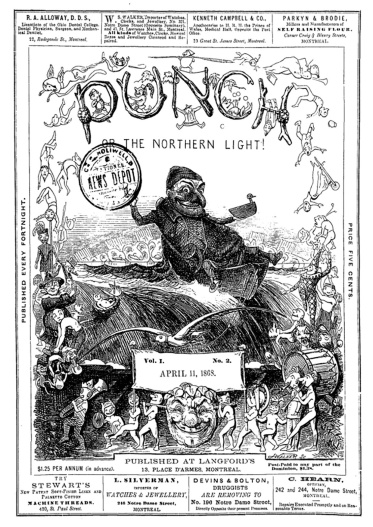
I’m sure we all have a memory of going to see the dentist as a child, and not always a happy one at that. I don’t remember much about him but I do recall the waiting room and the large pile of magazines you could read. I always opted for Punch because it had cartoons in it. I didn’t really understand most of them but they were still cartoons, so I tried to.
Punch has been around for a very long time and I use its political cartoons in teaching at visual sources for undergraduates. One of Punch’s founders was Henry Mayhew, whose investigative survey of life in London is also a treasure trove for social historians. In fact Mayhew’s work is sometimes the only primary source that used to tell the story of mid-nineteenth century London; something I find a little problematic at least. Mayhew’s journalism is useful, interesting and entertaining, but it is juts still one point of view, not the full picture.
From its creation in 1841 Punch, or the London Charivari (to give it its full title) liked to poke fun at the establishment. The French word ‘charivari’ referred to the ritual folk practice of humiliating those that offended public morals. In England we had a similar practice – ‘rough music’ – whereby wife-beaters, adulterers, ‘nags’ and the like were shamed by the entire village gathering outside their home to bash pots and pans together and shout abuse. We call this ‘Twitter’ today.
By the 1860s Punch, which had struggled at first, was well established and was being printed by the firm of Bradbury and Evans in London. Punch’s head office was at 85 Fleet Street in the heart of the newspaper district.
On Saturday 19 December 1868 three men appeared at the Guildhall Police court on a variety of charges relating tot he theft of copies of the magazine. The first was Samuel Watts who ran a beer shop on Fetter Lane, just around the corner from Punch’s offices. Watts was initially charged with in the unlawful possession of 256 copies of Punch magazine ‘well knowing the same to have been stolen’. He protested his innocence and was represented by a lawyer.
His brief, Mr Lewis, told the court that the police had ‘made a great deal about the defendant keeping a house which was frequented by bad characters’. But no one had complained about his beer shop in the seven years he’d run it and it was hardly his fault if the odd ‘bad character’ came in from time to time. After all, ‘it was not to be expected that his house would be frequented by gentlemen only’. The police accepted that Watts was not really a suspect in the case and so the magistrate discharged him but then swore him in as a witness.
Next to appear were the real culprits: James Connor and Alfred Clarke. Connor was 24 and Clarke just 19 and they were charged with stealing 300 copies of the publication from the Fleet Street offices on the 9th December. The court heard that a parcel containing the copies was taken from behind a counter and left at a coffee house at 90 Shoe Lane, run by William Bye. The parcel was left in the name of John Clarke, to be collected later.
A little after 3 another lad named George Harrison entered the pub and picked it up. Bye saw him hand it over to Alfred Clarke at the door and go off with it. From there Clarke and Connor distributed the copies of the paper to a number of newspaper vendors to sell in the streets for whatever they could get. They asked just 1d back for each copy sold.
One of these was Richard Bailey. He was in the Three Lions pub and saw Clarke and Connor playing at skittles. They asked him to sell some copies and he agreed, as he had no work at the time and the money was useful. But although he managed to sell some – at one and a half pence each – he soon realised the copies were stamped. They were supposed to be sold at 4d and he must have realised they were stolen. Not wanting to get into trouble he took them back to the thieves, who by now were playing bagatelle.
Connor and Clarke were eventually arrested by a detective in the City of London force. He picked up Clarke in Fleet Street and then discovered the missing copies of Punch behind the skittle alley in the games room of the Three Lions pub. On the 11 January Clarke and Connor were tried at the Old Bailey and convicted of the theft.
Clarke was sentenced to four months imprisonment but Connor came off much worse. He admitted to having previously been convicted (in 1866) and so the judge sent him away for seven years of penal servitude.
For stealing £12 worth of magazines. Ouch.
[from Lloyd’s Weekly Newspaper, Sunday, December 20, 1868]